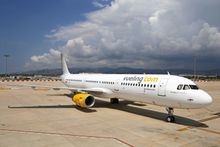 04 Jul 2023
04 Jul 2023
Tags: SAF, iag, Vueling, Aviation, Airline, avikor

Vueling, part of IAG, reveals that over 100,000 consumers have opted in to contribute to supply Sustainable Aviation Fuel (SAF) on the day of their flight contributing to the reduction of CO2 emissions, with SAF playing a crucial role in the decarbonisation of aviation by reducing CO2 emissions by 80% compared to traditional fuels.
The option to contribute is available during the booking process and is matched by Vueling to double the amount of SAF supplied. This is available as a result of the partnership with Avikor, a service offered by Exolum.
Following the recent one-year anniversary of this collaboration, Vueling reveals some of the results of this partnership highlighting that more than 50% of the engaged consumers using the SAF scheme are aged 35 to 64, 40% are younger than 34, and 9% are older than 65.
Avikor is now part of Vueling's ticketing online system enabling passengers to contribute with SAF through this alliance, resulting in over 145 tonnes already supplied. This accomplishment has helped to reduce the emissions of up to 350 CO2 tonnes, which is equivalent to 37 roundtrips from London Gatwick to Orly or 15 from Barcelona to London Gatwick.
Vueling, leader in connections between Spain and the UK is on track to achieve its 2030 goal of using 10% SAF, almost doubling that of the European Union's six-percent requirement. By 2030, Vueling hopes to supply more than 100,000 tonnes of SAF annually. Additionally, the IAG group to which Vueling belongs was the first airline group to commit to achieving net zero CO2 emissions by 2050 in the framework of its Flightpath Net Zero programme.
Although SAF is already a reality and can be used on the current aircraft, there are still some challenges in terms of production levels. The company advocates incentivising the production of SAF to accelerate the decarbonisation of aviation.
Franc Sanmarti, Director of Sustainability and Government Affairs at Vueling, says:
“Since the launch of the SAF supply contribution, Vueling has continued to offer competitive prices whilst also providing an option to reduce the environmental impact of flying, supporting the transition to carbon neutral and more sustainable transportation. Nevertheless, there is still a long way to go, as we need to accelerate SAF production if we want to meet the industry's demand in the short and medium term”.
Committed to minimising the effects of climate change and supporting sustainable development, Vueling also works through other main lines of action such as optimising routes in the framework of the Single European Sky and fleet efficiency, with new generation engines as well as reducing weight of the aircraft with the digitalisation of documentation and the use of lighter trolleys, helping to cut the emissions by up to 20%.
Regarding route optimisation, Vueling is working with air navigation service providers such as ENAIRE and Eurocontrol to ensure that flight paths are as efficient as possible, which is estimated to reduce CO2 emissions by 10%. Vueling is also working on optimising ground movements and flying at the optimum altitudes and speeds to reduce fuel consumption.
About Vueling
Vueling, part of IAG, is one of the main low-cost airlines in Europe and a key player in connections with Spain. In addition, Vueling is also a leading brand at the Josep Tarradellas Barcelona-El Prat airport, and in other important markets such as the city of Bilbao as well as the market between the mainland and the Balearic and Canary Islands.
Vueling reinforces its commitment with international growth, investing continuously in several bases such as London Gatwick, Paris Orly, Amsterdam, Florence and Rome.
For the summer season, the company has 23 direct routes already on sale.
In terms of sustainability, the company's commitment to the environment is paramount. IAG, the airline's parent company, has committed to achieve net zero carbon emissions by 2050 through the implementation of the FlightPath Net Zero programme, and to operate 10% of its flights with sustainable aviation fuel (SAF) by 2030.

